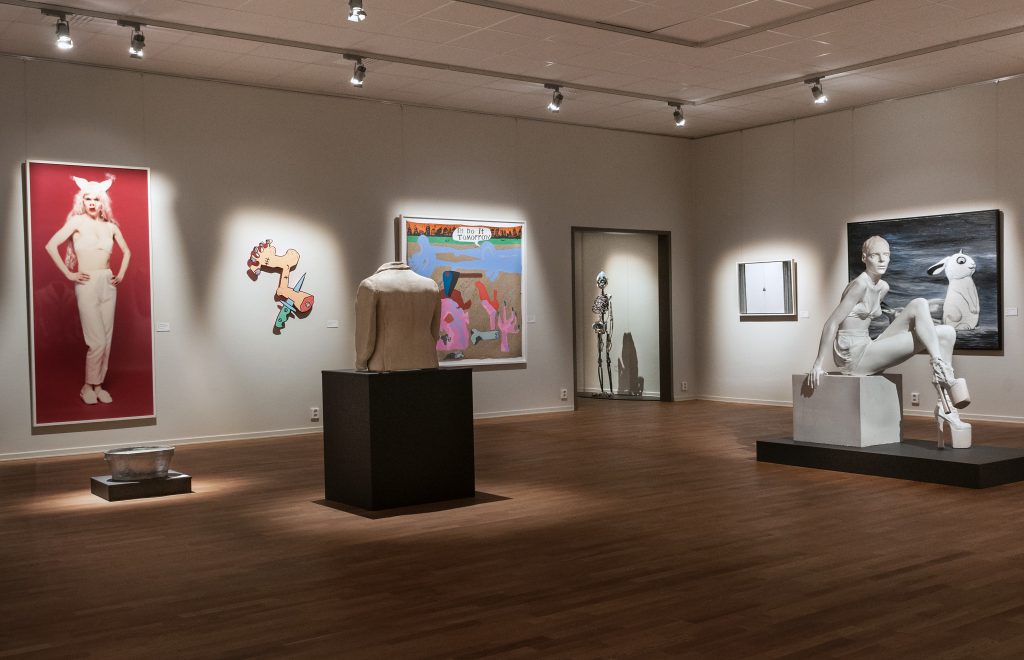Information in English

Welcome to Länsmuseet Gävleborg – County Museum of Gävleborg
About the County Museum of Gävleborg
The Gävle County Museum encompasses both the provinces of Gästrikland and Hälsingland and we have the whole county as our workplace. We work with cultural history, art, building and landscape conservation, archaeology, and with various cultural projects in the county’s municipalities. The museum itself is located on Södra Strandgatan 20 in Gävle.
Our history
The Rettig family owned a tobacco factory and ran a shipyard and a shipping company in Gävle in the 19th century. The museum’s history began in 1933 when Antonie Rettig, married into the family, died, bequeathing “John and Antonie Rettig’s Museum Fund to the city of Gävle”.
The donation was for a large amount of money, worth several million in today’s currency, and financed the building of the museum. Designed by the municipal architect, Sven Wranér, the building was completed in 1940 and was called the Gävle Museum. In accordance with the donors’ wishes, Antonie Rettig’s sister’s mansion in Copenhagen served as the architectural model. The donation also included around one thousand art and crafts objects, which provided the foundation for the museum’s collection.
Exhibitions
The Gävle County Museum has one of Sweden’s finest art collections and over 2,000 square meters’ exhibition space. The exhibitions are used for pedagogical purposes when we give guided tours and viewings, workshops and diverse programme activities. We also offer a wide spectrum of temporary exhibitions. Our largest exhibition space for temporary exhibitions is on the ground floor.
The museum collections
The collections contain almost 80,000 objects or groups of objects. A part of this – art, archaeological finds and utility objects, for example – are displayed in the permanent and temporary exhibitions housed within the museum building.
The collections of historical cultural objects originate in the items that Gästrikland’s Cultural History Society began to collect at the end of the 19th century. These collections have grown ever since through donations and purchases. The Rettig bequest, which funded the building of the museum in 1940, included extensive collections of art and arts and crafts as well. Since its inauguration, the museum’s collections have also been augmented by contributions from the Friends of The Gävle County Museum. The collection includes everything from prehistorical stone axes, large funeral carriages, and exquisite linen napkins from the 18th century to dresses in synthetic materials from the 1970s and a large collection of porcelain and ceramics from the local Gefle Porslin and Bo Fajans’ factories.
The archives
Over the years the county museum has assembled a comprehensive archive, where both the museum’s own documents and others from the general public, companies or associations are kept. Our archive is constantly growing. Every year we receive private documents from people who have chosen to donate them us. The part of the archives that relates to our own museum work – the official archives – is also continually expanding as we always document the work we do.
Our archives contain information on companies as well as private persons. The archives encompass the whole county and so you can find material on your own village, farm, or perhaps even on yourself! We also have an interesting naval/shipping archive, with logbooks and shipping documents.
The simplest way to find our archives is to go through the museum’s reference room. You can delve on your own or get help with your enquiries.
Cultural environments
One of the most important goals for us who work with cultural milieus is a good living environment for all citizens. This means that we take care and consideration of the old buildings when we build new ones or renovate; that we are careful with what our parents’ and older generations created; and that we do not destroy the remains of our ancient past.
We work with archaeology, the history of building and settlements, and building conservation. We believe that well-preserved housing districts, carefully handled city centres, and open, vital landscapes are very important for our well-being. We also believe that historical milieus, buildings and objects must be preserved and revitalised in order for us to understand how our present-day society has emerged.
To feel historical connections can provide security in a world that changes with ever increasing alacrity. But it is also important that buildings be used, that they are lived in and a vital part of the community. An old abandoned building deteriorates rapidly – who is to look after a house, a landscape or a prehistoric artefact if everyone has moved away? We must accept that landscapes and buildings change, but when the changes are made they should be grounded in care and respect. Renovations and new building in older environments must be done in the light of knowledge and awareness of the qualities these environments possess. Our historical sites and buildings are valuable assets, possibly the most valuable the county possesses; we should take care of them.
Museum Shop
In the museum shop you can purchase things that are made in, or with connections to, the county and its history – for example linen from Hälsingland and glass by famous Gävle designer Gunnar Cyrén. The shop also offers books and postcards, sweets and toys.
Visit us
If you arrive in Gävle by train, it takes about 3 minutes to walk to the museum. Our street address is Södra Strandgatan 20.
The museum is a large red brick building with two wings. The main entrance is in the middle section. The entrance for disabled people is in the basement, directly under the main entrance.
Opening hours
Monday: Closed
Tue, Thurs, Friday:11 am–5 pm
Wednesday: 11 am – 8 pm
Saturday – Sunday: 12 noon–4 pm
Admission:
Adult: 120 SEK
Senior: 90 SEK
Student: 90 SEK
Under the age of 20: Free admisson
Season ticket (12 months): 295 SEK
